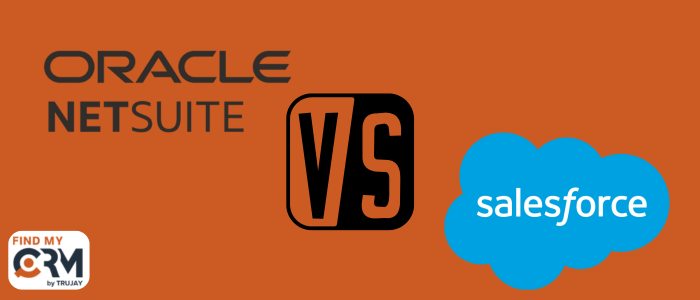What is NetSuite CRM?
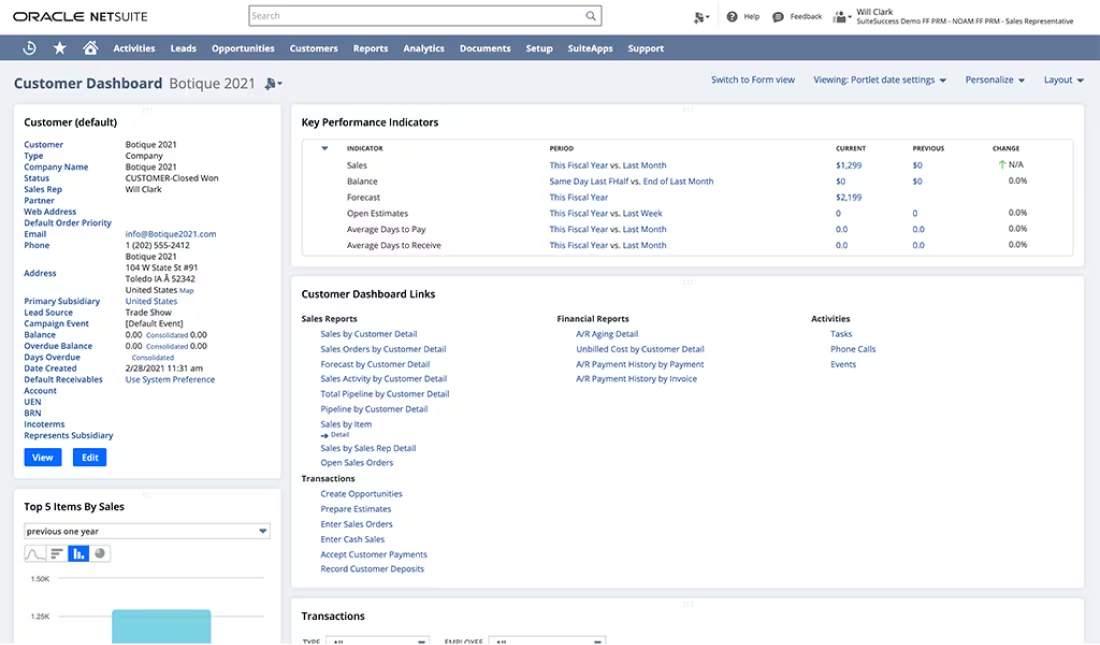
Oracle developed NetSuite CRM, a cloud-based CRM solution that provides a real-time view of the entire client lifecycle. It enables users to manage their prospects and customers from the initial point of contact to conversion, fulfillment, renewal, upgrades, and support.
NetSuite CRM is well-known among many businesses, both large and small. NetSuite can satisfy all of your needs, regardless of your company's size or industry. Depending on the software you choose, this CRM can help you benefit from your activities in order to set and achieve sales targets.
[Related article: NetSuite Overview: Features, Benefits, Pricing, and More [2024]]
In this section, you can briefly get acquainted with these powerful CRM systems for various business preferences:

Fireberry
By using Fireberry, you can easily manage all your business needs with a user-friendly system. Your unique business deserves a platform built just for you, so you can maximize your time and productivity where it matters most.
-Mar-27-2024-12-45-07-2388-PM.png)
monday sales CRM
Let monday sales CRM do the grunt work while your team stays focused on high-level tasks, such as creative projects, business strategy, and relationship building.
-Mar-27-2024-12-45-00-9156-PM.png)
Zoho
It is a web-based email marketing management service for small and medium businesses. It automates the entire marketing process - from managing your email marketing campaign to maintaining mailing lists.

Capsule
Capsule is a cloud-based CRM platform that helps businesses build relationships with customers. It enables users to store contacts, track sales opportunities, automate workflows and manage projects.
What is Salesforce?
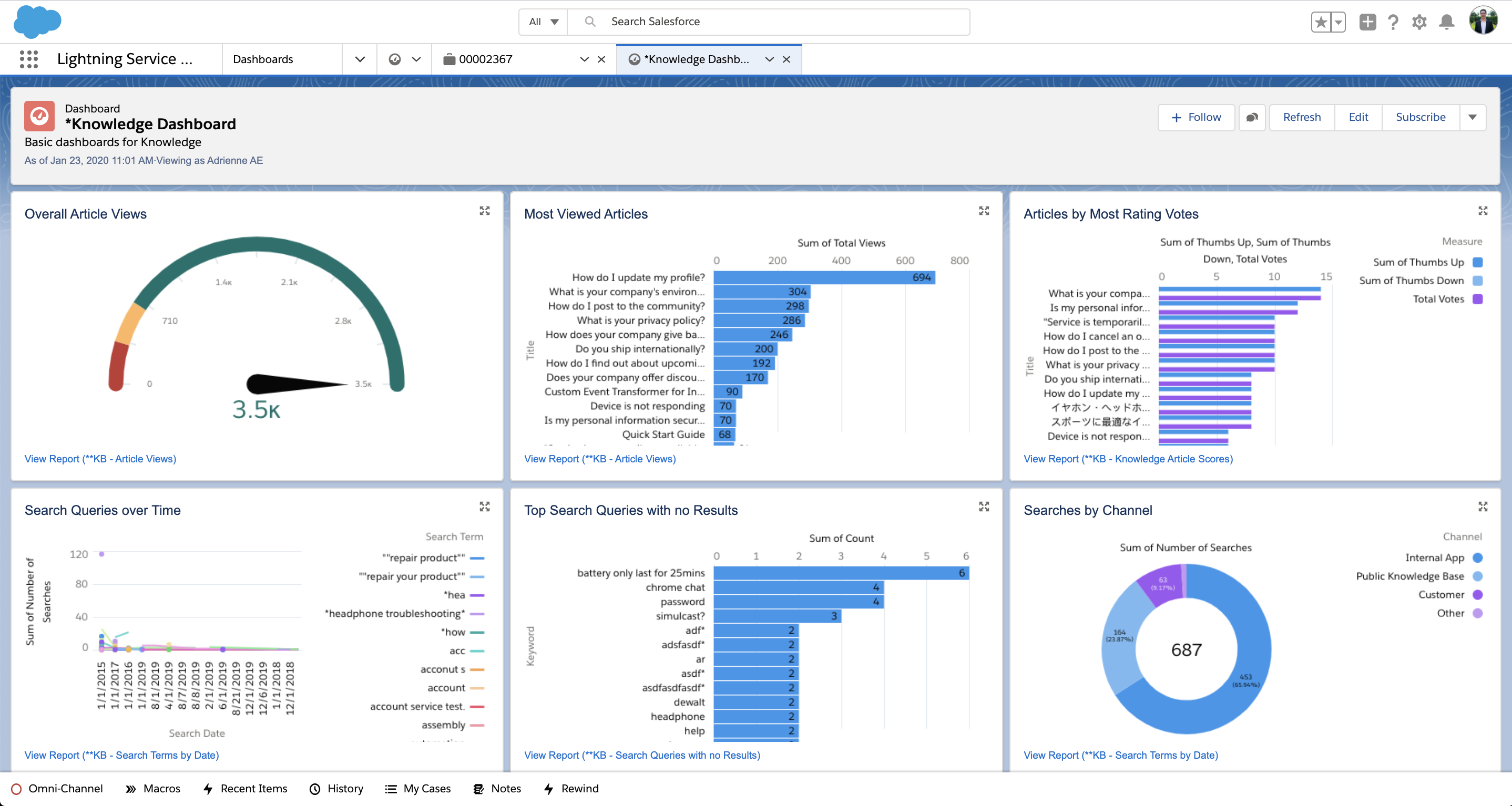
Salesforce provides a variety of software products and services, including Salesforce CRM, a cloud-based software system that helps businesses manage customer interactions and data.
Salesforce CRM has many functionalities, including sales forecasting, lead management, opportunity tracking, and customer service management. The program is highly adaptable and can be adjusted to meet the unique demands of each organization.
[Related article: How much does Salesforce cost?]
Comparison Chart of NetSuite and Salesforce
|
Criteria |
||
|
Rating on Capterra |
4.1/5 |
4.4/5 |
|
Customer Support |
|
|
|
Pricing |
Custom pricing model |
Salesforce Sales Cloud:
|
|
Free Plan |
❌ |
❌ |
Main Differences Between Salesforce vs NetSuite
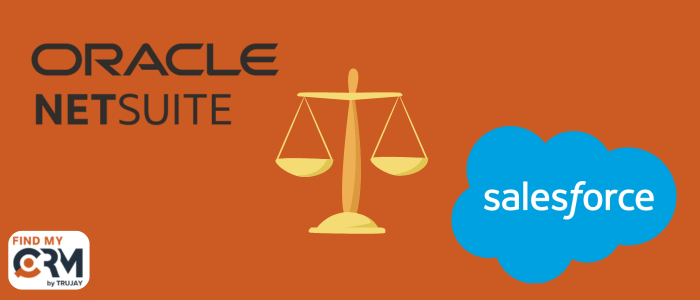
NetSuite CRM and Salesforce are both designed to manage customer relationships, offering a centralized hub for storing and organizing lead and customer data.
However, the key difference lies in their structures: NetSuite operates as an Enterprise Resource Planning (ERP) system including a CRM system, while Salesforce is focused on CRM functionality. Despite this distinction, both platforms boast extensive customization options and have strong reputations as cloud-based solutions, with a plethora of integration possibilities.
In terms of popularity and specialization, Salesforce takes the lead, but at a higher cost. On the other hand, NetSuite offers a more comprehensive suite of features, particularly excelling in integrating accounting and finance functionalities. This makes it a compelling choice, especially for small to mid-sized businesses seeking a robust, all-in-one solution.
[Related article: Pipedrive vs Salesforce vs HubSpot CRM vs Zoho CRM vs Highrise CRM: Mega Comparison]
Similarities Between NetSuite and Salesforce
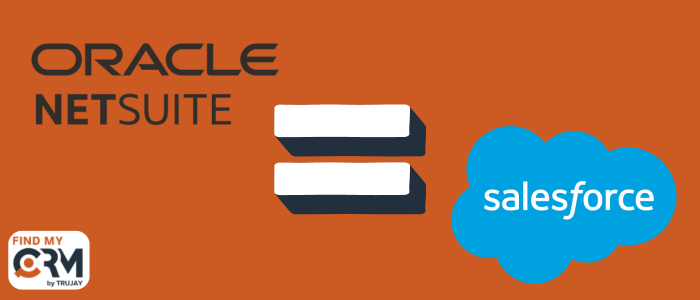
NetSuite and Salesforce, despite serving different primary purposes, share several similarities that make them popular choices among businesses:
- While NetSuite primarily focuses on enterprise resource planning (ERP) and Salesforce on customer relationship management (CRM), both platforms offer comprehensive suites of tools and functionalities that extend beyond their core offerings. This includes features for sales, marketing, customer service, finance, and more, providing businesses with a holistic solution to manage various aspects of their operations.
- Both NetSuite and Salesforce operate as cloud-based software platforms, offering the convenience of accessibility from anywhere with an internet connection.
- Both NetSuite and Salesforce offer extensive integration capabilities, enabling seamless connectivity with other business systems and applications.
- Both NetSuite and Salesforce offer robust analytics and reporting capabilities, empowering users to gain valuable insights into their business performance. From customizable dashboards to advanced reporting tools, both platforms enable data-driven decision-making and facilitate strategic planning.
NetSuite vs Salesforce: Functionality
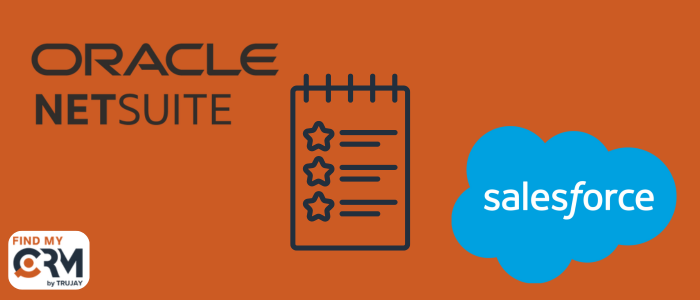
Customer Relationship Management🤝🏼
Effective customer relationship management (CRM) is fundamental to any successful business operation because it organizes all contact data in one central hub.
Salesforce, a popularizer of CRM, offers a comprehensive suite of modules such as Sales Cloud, Marketing Cloud, and Service Cloud, through which CRM data seamlessly flows. This integration ensures that all your CRM needs are met, providing access to customer information and engagement histories essential for informed decision-making and strategic planning. Additionally, Salesforce empowers users with robust reporting and analytics capabilities, leveraging CRM data to drive business insights.
Similarly, NetSuite offers a dedicated CRM package, although its functionality extends beyond traditional CRM boundaries. Like Salesforce, NetSuite's CRM tools intersect with various departments including sales, marketing, customer service, and partner relationship management. This integrated approach ensures holistic management of customer interactions and facilitates the generation of intelligent business insights, aligning with the main goal of enhancing overall business performance.
This is not a simple category to compare NetSuite vs Salesforce. Salesforce leads here because their CRM tools feel more streamlined and do not suffer from feature overcluttering, as you might notice in a solution like NetSuite.
[Related article: CRM Cost Comparison of Top 21 Platforms (2024)]
Marketing Automation🎯
NetSuite and Salesforce both offer robust marketing automation solutions, each with its own strengths.
NetSuite integrates its marketing automation toolkit seamlessly into its CRM package, allowing users to effortlessly create targeted campaigns and track their performance. With features like email, direct mail, and multi-channel outreach capabilities, alongside tools such as a landing page builder and forms tool, NetSuite provides a comprehensive solution for effective marketing automation.
On the other hand, Salesforce Marketing Cloud leverages advanced AI to optimize campaign performance. Its suite of tools includes an email marketing studio, a customer journey builder, and advertising tools that utilize CRM data. With a high level of customization and real-time analytics, Salesforce Marketing Cloud offers a powerful marketing automation platform.
Sales Features📈
Sales are the lifeblood of any business, driving growth and sustaining operations. Both NetSuite and Salesforce offer powerful sales features to attract new customers and maximize revenue from existing ones.
Salesforce Sales Cloud equips sales teams with automation tools for managing activities, leads, and opportunities. Its robust forecasting and reporting capabilities help improve pipeline management, while features like quote generation and contract approval streamline the sales process. Additionally, Salesforce's sales engagement feature enables customization to meet unique customer needs, enhancing customer satisfaction.
NetSuite, as an ERP system, also empowers businesses to win new clients and close deals efficiently. Its opportunity management tools aid in managing the sales funnel, while features like quote building, sales forecasting, and sales rep compensation systems optimize sales operations. Furthermore, NetSuite offers intelligent item recommendations to facilitate deal-making processes.
When it comes to sales, both NetSuite and Salesforce offer compelling solutions, making it a closely contested race. However, Salesforce edges ahead with its more intuitive features, providing users with a smoother and more seamless sales experience.
ERP💪🏻
When comparing ERP (Enterprise Resource Planning) versus CRM (Customer Relationship Management), it's crucial to note that ERP includes a broader array of functionalities beyond customer management and sales.
NetSuite stands out in this category by offering a comprehensive suite of tools to manage various aspects of business operations. With features such as procurement, warehouse management, and order management, supported by supply chain management (SCM) capabilities, NetSuite streamlines activities across the entire enterprise. Additionally, its financial management toolkit provides essential accounting software and other features to facilitate smooth financial operations.
On the other hand, Salesforce lacks a dedicated ERP system, necessitating integration with third-party tools for functionalities like inventory and shipping management.
In this NetSuite-Salesforce comparison, NetSuite is the clear winner, offering a comprehensive solution for enterprise resource planning needs that surpasses what Salesforce can provide. With NetSuite, businesses can effectively manage all aspects of their operations, ensuring efficiency and scalability in their processes.
[Related article: The Comprehensive Guide to Integrating CRM Systems with Enterprise-level ERPs]
Commerce🛒
When comparing NetSuite CRM vs Salesforce for scaling your retail business, it's essential to consider your specific needs and the complexity of your operations.
Salesforce offers a dedicated module for e-commerce operations, catering to both online stores and brick-and-mortar establishments. With robust tools for both B2B and B2C operations, Salesforce provides seamless integration between order management, CRM, and customer service, ensuring a streamlined experience for retailers.
On the other hand, while NetSuite offers the flexibility to leverage ERP tools for commerce and e-commerce operations, the comprehensive nature of its ERP solution may be overwhelming for simpler small businesses and online shops. The complexity and cost associated with implementing the full NetSuite ERP suite might outweigh the benefits for businesses with more straightforward needs.
Salesforce vs. NetSuite: Ease of Use
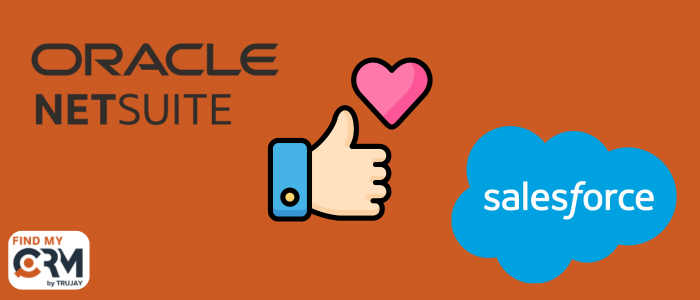
Salesforce is known for its complexity, yet many users find it manageable once they overcome the initial learning curve. Those with prior CRM software experience tend to adapt more swiftly. The platform excels in visually presenting data and insights, offering personalized AI insights and sentiment analysis to enhance user experience. However, the ease of use can vary based on the complexity level of your Salesforce package, which may include basic or advanced features and add-ons. Despite this, most businesses should anticipate a learning curve when implementing Salesforce CRM.
Similarly, NetSuite presents a challenge in navigation due to its complexity, although users familiar with other Oracle products may find it easier to grasp. Customer feedback and reviews about NetSuite's user-friendliness are mixed, with some finding it relatively straightforward while others struggle with a steep learning curve and a cumbersome interface. Although the user interface may appear clunky and outdated, information is presented clearly on each dashboard or screen, and reports are easily customizable and exportable.
NetSuite or Salesforce: Customer Support
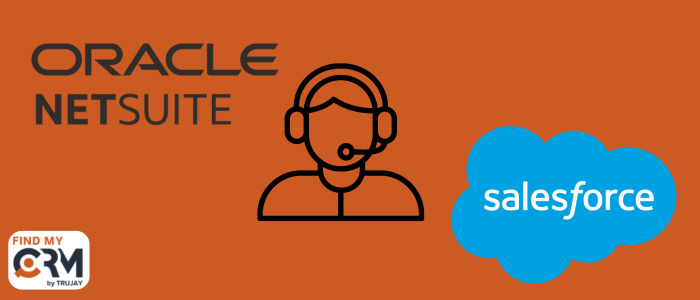
Salesforce offers comprehensive customer service, providing support via phone, email, and chat around the clock, every day of the week. Customers on higher-tier plans enjoy premier support, offering extended assistance for noncritical issues, expert guidance, and personalized resources. This premier support option can also be added on for an additional fee, equivalent to 30 percent of your net license fees. Additionally, Salesforce users can open tech support cases conveniently through an online form.
On the other hand, NetSuite includes 24/7 basic customer support across all its plans. In addition to this, users have access to a wealth of online self-help resources, including an extensive tech support forum and helpful how-to guides. For those seeking a higher level of assistance, NetSuite offers Premium Support, which includes support for noncritical issues, priority case queuing, and specialized commerce response services.
[Related article: What is Customer Service? Definition, Types, and Benefits]
NetSuite CRM vs Salesforce: Integrations
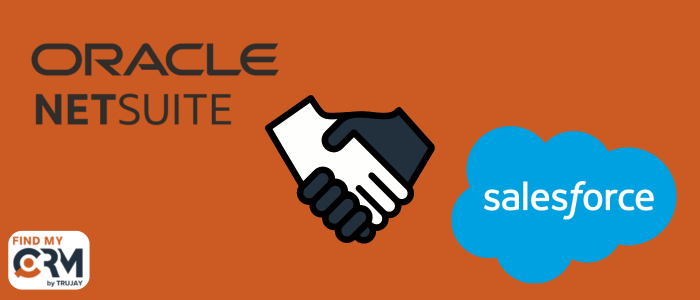
NetSuite CRM seamlessly integrates with its suite of ERP products, consolidating all your business data, from HR to finance, in one convenient location. Additionally, it offers integration options with various on-premise or cloud-based applications using the SuiteCloud technology platform. However, it lacks native integration with commonly used tools like Skype, Facebook, Twitter, or Office 365.
In contrast, Salesforce is renowned for its flexible integration capabilities, thanks to its virtual integration technology. You can easily connect it to your ERP software, e-commerce platform, accounting software, and more through the extensive AppExchange marketplace, which hosts thousands of third-party integrations.
Salesforce vs NetSuite: Pricing
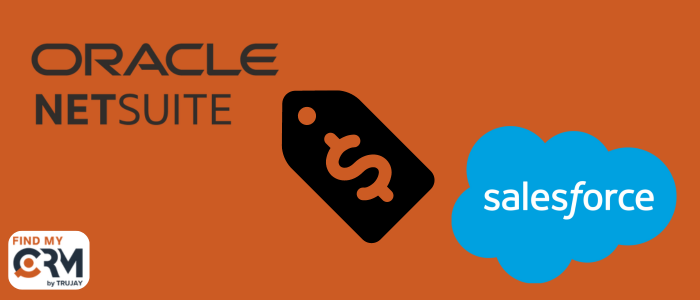
NetSuite does not provide pricing information on its website, requiring direct contact for a quote or consulting a NetSuite reseller.
Here's a breakdown of NetSuite's pricing structure:
- The annual license fee for the entire NetSuite platform.
- Price varies based on optional modules and the number of users required.
- NetSuite CRM is included with the platform.
- Pricing is per user, meaning each employee needing access to NetSuite CRM requires their own user license.
- Ability to activate new modules or add users as your business expands.
In contrast, Salesforce offers various pricing tiers depending on the number of users and modules purchased, with the option of a free trial followed by an annual contract.
Here's an overview of Salesforce Sales pricing:
- Starter Suite: Includes simple CRM suite with marketing, sales, and service, priced at $25 per user per month.
- Professional: Offers the CRM for sales at $80 per user per month.
- Enterprise: Provides a customizable sales CRM at $165 per user per month.
- Unlimited: Offers CRM for sales with intelligent automation and developer support built-in, priced at $330 per user per month.
- Einstein 1 Sales: The best solution for sales with trusted AI and data, priced at $500 per user per month.
[Related article: 18 Best Low Cost CRM in 2024 - Make Your Choice!]
Final Decision: Salesforce or NetSuite?
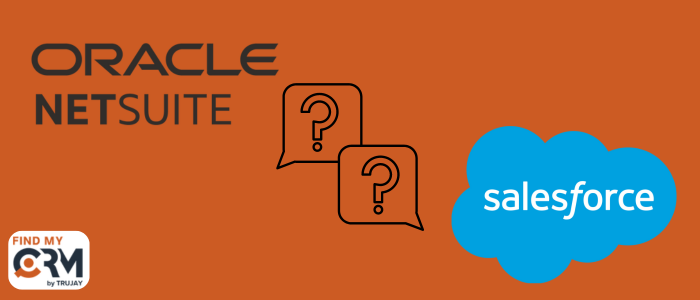
When it comes to choosing the right CRM for your business, prioritizing customer relations is the key point. So, let's conclude our Salesforce-NetSuite comparison.
For small to mid-range businesses, NetSuite CRM offers a comprehensive solution that goes beyond simple data gathering. While it may require some effort to set up initially, NetSuite CRM provides robust features and functionalities that can benefit businesses of various sizes and industries.
On the other hand, if you're seeking a reliable CRM for long-term use, Salesforce CRM is an excellent choice. With its versatility and scalability, Salesforce CRM is equipped to grow alongside your business and meet evolving needs.
